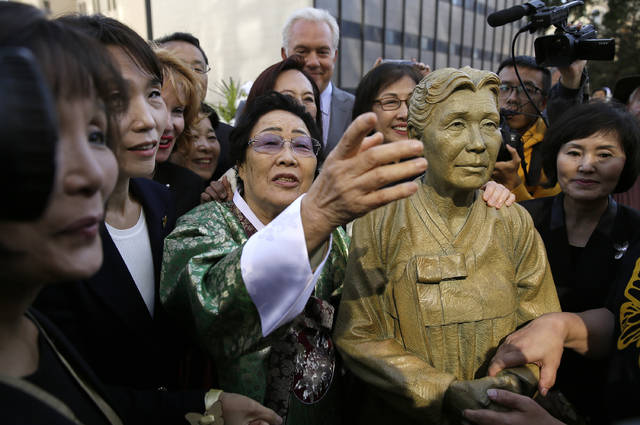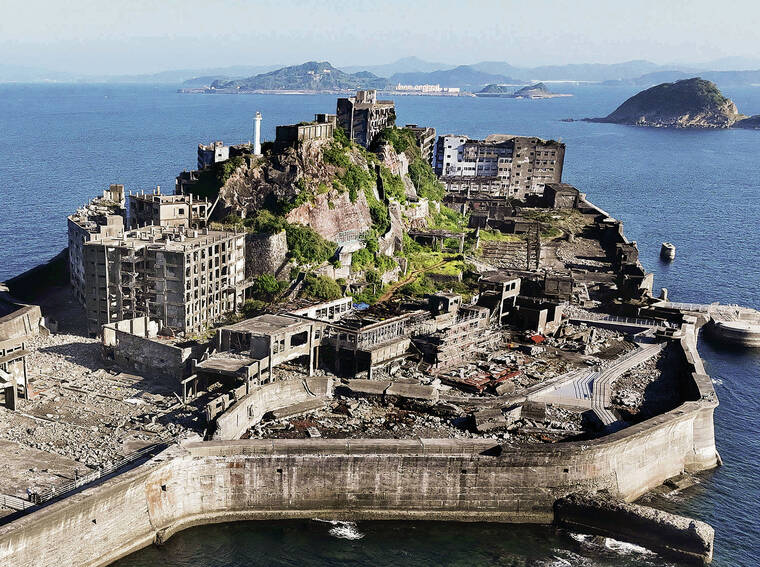Osaka leaders complain about S.F. ‘comfort women’ statue

ASSOCIATED PRESS
Former World War II “comfort woman” Yongsoo Lee, 89, of South Korea, stood by a statue of Haksoon Kim while looking at the “Comfort Women” monument after it was unveiled last month in San Francisco.
OSAKA >>
In a meeting with U.S. Ambassador to Japan William Hagerty in September, Osaka’s leaders expressed solidarity with America over North Korea but concern that San Francisco erected a monument to the wartime “comfort women” who were forced into Japanese military brothels before and during World War II.
The meeting saw Hagerty meet with Osaka Gov. Ichiro Matsui, who heads Nippon Ishin no Kai, an opposition party that works closely with Prime Minister Shinzo Abe’s Liberal Democratic Party on major policy issues, as well as Osaka Mayor Hirofumi Yoshimura. Osaka and San Francisco have a sister-city relationship.
Much of the meeting focused on North Korea, Osaka officials said.
Hagerty spoke of the North Korean threat and urged stronger bilateral cooperation, while Matsui told the ambassador that Japan was grateful President Donald Trump touched upon the issue of the abductees taken by North Korean agents decades ago in his speech to the United Nations last week.
But Matsui and Yoshimura also expressed concern over the unveiling in San Francisco of the latest monument to the comfort women. Matsui and Yoshimura strongly opposed the monument, as did former Osaka Mayor Toru Hashimoto, who canceled a trip to San Francisco in 2013 after being internationally condemned for suggesting the comfort women system had been necessary at the time.
Don't miss out on what's happening!
Stay in touch with breaking news, as it happens, conveniently in your email inbox. It's FREE!
“We’re concerned mistaken history based on news reports will mean the (U.S.-Japan) relationship won’t progress very well for the next generation. I want this to be conveyed to the president,” Matsui told Hagerty.
“We have to rethink the basis of our sister-city relationship,” added Yoshimura.
According to a U.S. State Department spokesperson, Hagerty told Matsui and Yoshimura that, though there may be sensitive historical issues that need to be resolved, he and President Trump are focused on the future; that trilateral cooperation — from the U.S., Japan, and South Korea — is needed to confront the North Korean regime; and that Japan and the U.S. needed to build on their kizuna (shared bonds) to stand against this threat. The North is officially known as the Democratic People’s Republic of Korea.
Other places in the U.S. have erected comfort women statues or memorials, but San Francisco is the first major city to do so. It acted after the city’s board of supervisors passed a resolution in 2015 despite protests from the Japanese government and residents in both the U.S. and Japan.
“The Japanese government’s denial tactic has proven a failure in the United States and other parts of the world. People in the U.S. view the comfort women issue as a universal human-rights issue that everyone needs to know and care about,” said Phyllis Kim, executive director of the Korean American Forum of California, who played a major role in convincing San Francisco to establish the memorial, in an emailed statement.
Despite a historic 2015 agreement between South Korea and Japan to settle the issue permanently, the issue continues to plague relations between the two countries.




